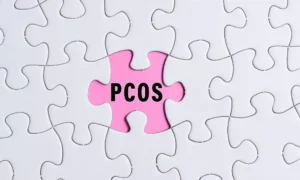Polycystic Ovary Syndrome, often abbreviated as PCOS, stands as a complex hormonal disorder that affects a significant number of women globally. This enigmatic condition goes beyond its name, involving a myriad of symptoms and potential complications that impact various aspects of a woman’s health. This article delves into the intricacies of PCOS and its cure, its impact on women’s health, and explores various approaches to manage and alleviate its symptoms.
Contents
What Is PCOS? 
PCOS stands for Polycystic Ovary Syndrome. It is a common hormonal disorder that affects people with ovaries, often during their reproductive years. In PCOS, the ovaries may not regularly release eggs, and there may be an overproduction of androgens (male hormones) in the body.
Ovulation takes place when a mature egg is released from one of the ovaries, with the aim of potential fertilization by a male sperm. If the egg remains unfertilized, it is expelled from the body during the menstrual period.
In certain instances, some women may not produce sufficient hormones necessary for ovulation. When ovulation fails to occur, the ovaries may form numerous small cysts, which, in turn, produce hormones known as androgens. Women with Polycystic Ovary Syndrome (PCOS) often experience elevated levels of androgens, leading to disruptions in their menstrual cycle and the manifestation of various PCOS symptoms.
The typical approach to managing PCOS involves the use of medication. While this doesn’t provide a cure for PCOS, it effectively mitigates symptoms and helps prevent certain associated health issues.
Symptoms Of PCOS
Polycystic Ovary Syndrome (PCOS) is a hormonal disorder that can manifest with a variety of symptoms. It’s important to note that the severity and combination of symptoms can vary among individuals. Common symptoms of PCOS include:
- Irregular Menstrual Cycles
Menstrual cycles may be irregular, with unpredictable timing and flow. - Ovulatory Dysfunction
Ovulation may not occur regularly, leading to fertility challenges for some individuals. - Excess Androgens
Elevated levels of androgens (male hormones) can result in symptoms such as:- Excess facial or body hair (hirsutism)
- Acne
- Thinning hair or male-pattern baldness (alopecia)
- Polycystic Ovaries
Multiple small cysts on the ovaries can be detected through imaging tests like ultrasound. - Insulin Resistance
Insulin resistance is common in PCOS and may lead to symptoms such as:- Weight gain, especially around the abdomen
- Difficulty losing weight
- Increased risk of type 2 diabetes
- Skin Changes
Darkening of the skin, particularly in skin folds, due to insulin resistance (acanthosis nigricans) - Mood Changes
Some individuals with PCOS may experience mood swings, anxiety, or depression. - Pelvic Pain
Pelvic pain may occur, especially during menstruation. - Sleep disturbances
Sleep apnea is more common in individuals with PCOS.
It’s important to recognize that not all individuals with PCOS will experience every symptom, and the severity of symptoms can vary. Additionally, some women with PCOS may not show noticeable symptoms, making diagnosis challenging without proper evaluation by a healthcare professional. If you suspect you may have PCOS or are experiencing related symptoms, it’s advisable to consult with a healthcare provider for a thorough assessment and appropriate management.
Conventional Treatment Approaches To Manage PCOS 
Although there is no known cure for Polycystic Ovary Syndrome (PCOS), there are conventional treatments that aim to manage symptoms and improve overall health. Here are some major conventional treatment approaches for PCOS:
- Birth Control Pills
Oral contraceptives can help regulate menstrual cycles, reduce androgen levels, and alleviate symptoms such as acne and excess hair growth.
- Anti-Androgen Medications
Drugs like spironolactone can be prescribed to counter the effects of elevated androgens, helping to manage symptoms like acne and hirsutism (excess hair growth).
- Metformin
This medication is often used to improve insulin sensitivity in women with PCOS, particularly those who have insulin resistance. Enhanced insulin sensitivity can aid in regulating menstrual cycles and addressing metabolic issues.
- Fertility Medications
For women trying to conceive, fertility drugs such as clomiphene citrate may be recommended to induce ovulation.
- Lifestyle Modifications
Changes in diet and exercise are crucial components of PCOS management. Maintaining a healthy weight and engaging in regular physical activity can help improve insulin sensitivity and regulate menstrual cycles.
- Surgery
In cases where cysts are causing significant pain or fertility issues, a surgical procedure called ovarian drilling may be considered. This involves making small incisions in the ovaries to reduce androgen production and improve ovulation.
- Counseling and Support
Dealing with the emotional and psychological aspects of PCOS is important. Counseling and support groups can help individuals cope with the challenges and uncertainties associated with the condition.
It’s important to note that the choice of treatment depends on individual symptoms, health goals, and whether a woman with PCOS is trying to conceive. Healthcare professionals typically tailor treatment plans to address the specific needs of each individual.
Natural Approaches To PCOS Management
Natural approaches to managing PCOS often focus on lifestyle modifications and comprehensive strategies to address underlying hormonal imbalances. Here are some natural approaches to PCOS management:
Healthy Diet
- Balanced Nutrition: Emphasize a well-balanced diet with whole foods, including plenty of fruits, vegetables, lean proteins, and whole grains.
- Low Glycemic Index (GI) Foods: Choose foods with a lower glycemic index to help regulate blood sugar levels, as insulin resistance is common in PCOS.
Regular Exercise
- Aerobic Exercise: Engage in regular aerobic activities like walking, jogging, or cycling to improve insulin sensitivity and assist with weight management.
Weight Management
- Maintain a Healthy Weight: Achieving and maintaining a healthy weight can help regulate hormonal imbalances associated with PCOS.
Stress Reduction
- Mind-Body Techniques: Practice stress-reducing techniques such as yoga, meditation, or deep breathing to manage stress, which can impact hormone levels.
Herbal Supplements
- Spearmint Tea: Some studies suggest that spearmint tea may help reduce symptoms of excess hair growth in women with PCOS.
- Cinnamon Supplements: Cinnamon may have potential benefits for improving insulin sensitivity.
Vitamin and Mineral Supplements
- Inositol: Some studies indicate that inositol supplements may help improve insulin sensitivity and regulate menstrual cycles.
- Vitamin D: Adequate levels of vitamin D are important for overall health, and supplementation may be beneficial for those with PCOS.
Acupuncture
- Traditional Chinese Medicine: Acupuncture, a component of traditional Chinese medicine, is sometimes used to help regulate menstrual cycles and reduce symptoms of PCOS.
Chiropractic Care
- Spinal Adjustments: Chiropractic care may be explored to help regulate the function of the nervous system and improve overall well-being.
Individuals with PCOS need to consult with healthcare professionals before making significant changes to their lifestyle or starting any supplements. A personalized approach, considering individual symptoms and health goals, is crucial for effective PCOS management.
Conclusion
In conclusion, navigating the path to wellness with PCOS involves a multifaceted approach that considers both conventional and natural strategies. By understanding the condition, embracing a healthy lifestyle, and seeking support, women can effectively manage PCOS and enhance their overall well-being.
If you are facing PCOS related issues, PCOS treatment at HerMantra can help. Book your free trial online pcos treatment session now.




